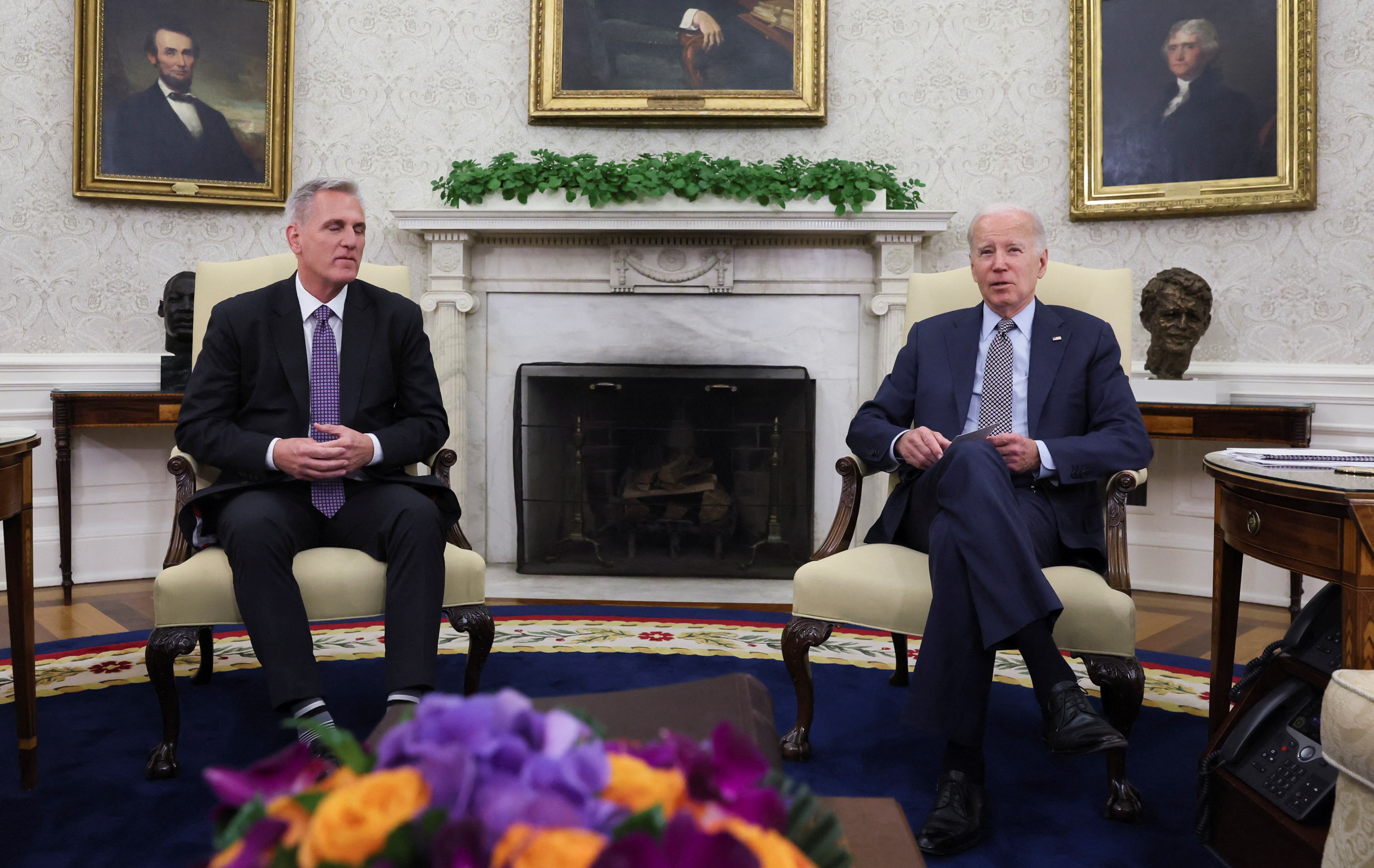WASHINGTON, May 22 (Reuters) – President Joe Biden and House Speaker Kevin McCarthy met at the White House on Monday to discuss raising the U.S. government’s $31.4 trillion debt ceiling.
The Democratic leader and top congressional Republicans have struggled to make progress on a deal, as McCarthy pressures the White House to agree to spending cuts in the federal budget that Biden considers “radical” and the president imposes new taxes on wealthy Republicans. Reject.
They have just 10 days – until June 1 – to reach an agreement to raise the government’s self-borrowing limit or trigger unprecedented debt repayments that economists say could bring on a recession.
The two leaders gave no indication that an agreement on views was imminent, speaking to reporters before the meeting.
Biden said he was “hopeful” they could make some progress. He said a bipartisan agreement is needed for both parties to “sell” to their constituencies, and there may still be some disagreements.
Sitting next to Biden in the Oval Office, McCarthy said, “I think we can finally find common ground” but those differences remain.
Treasury Secretary Janet Yellen on Monday offered a sobering reminder of how little time remains, saying the previous estimated default date was June 1 and that it was “highly likely” the Treasury would not be able to pay off all government obligations by early June. The debt ceiling has not been raised.
White House aides met with Republican negotiators on Capitol Hill for two hours on Monday, and early indications are that talks went well.
Any deal to raise the cap would have to pass both houses of Congress and would therefore depend on bipartisan support. McCarthy’s Republicans control the House 222-213, while Biden’s Democrats hold the Senate 51-49.
Failure to raise the debt ceiling could roil financial markets and trigger defaults that would raise interest rates on everything from car payments to credit cards.
US markets rose on Monday as investors awaited updates on the talks.
If Biden and McCarthy come to an agreement, it would take several days to push the legislation through Congress. McCarthy said a deal must be reached this week to pass Congress and be signed into law by Biden to avoid default.

[1/4] House Speaker Kevin McCarthy (R-CA) sits with U.S. President Joe Biden for debt ceiling talks in the Oval Office of the White House in Washington, May 22, 2023. REUTERS/Leah Millis
A White House official on Monday said Republican negotiators last week proposed additional cuts to programs that provide food assistance to low-income Americans, and stressed that no deal could pass Congress without bipartisan support.
Cuts and clawbacks
Republicans favored discretionary spending cuts, new work requirements for some programs for low-income Americans and a clawback of COVID-19 aid approved by Congress but not yet spent in exchange for a debt ceiling increase to cover lawmakers’ costs. Previously approved spending and tax deductions.
Democrats want to keep spending steady at this year’s levels, while Republicans want to return to 2022 levels. A plan passed by the House last month would cut government spending by 8% next year.
Biden, who has made the economy a centerpiece of his domestic agenda and is running for re-election, has said he would consider spending cuts along with tax changes, but called the Republicans’ latest offer “unacceptable.”
The president tweeted that he will not support “Big Oil” subsidies and “rich tax cheats” while jeopardizing health and food assistance for millions of Americans.
Both sides must weigh any concessions against pressure from hard-line factions within their own parties.
Some members of the far-right House Freedom Caucus insisted on halting the talks, demanding that the Senate take up their House-passed legislation, which was rejected by Democrats.
McCarthy, who made extensive concessions to right-wing hardliners to win the speakership, risks being fired by members of his own party if he doesn’t like the cut deal.
After losing the 2020 election to Biden, former Republican President Donald Trump has called for a default if Republicans don’t meet all of their targets, downplaying any economic consequences.
Liberal Democrats have pushed back against any cuts that would harm families and low-income Americans, with some urging Biden to act on his own by invoking the Constitution’s 14th Amendment — something the president said Sunday would face sanctions.
The amendment states that “the validity of the public debt of the United States … shall not be questioned,” but this provision has often been overlooked by courts.
Reporting by David Morgan, Richard Cowan and Andrea Shalal; Written by Susan Hevey; Editing by Lisa Shumaker and Stephen Coates
Our Standards: Thomson Reuters Trust Principles.

/cloudfront-us-east-2.images.arcpublishing.com/reuters/YDNUGFVXG5KETJ6ZV2LEL24KUY.jpg)